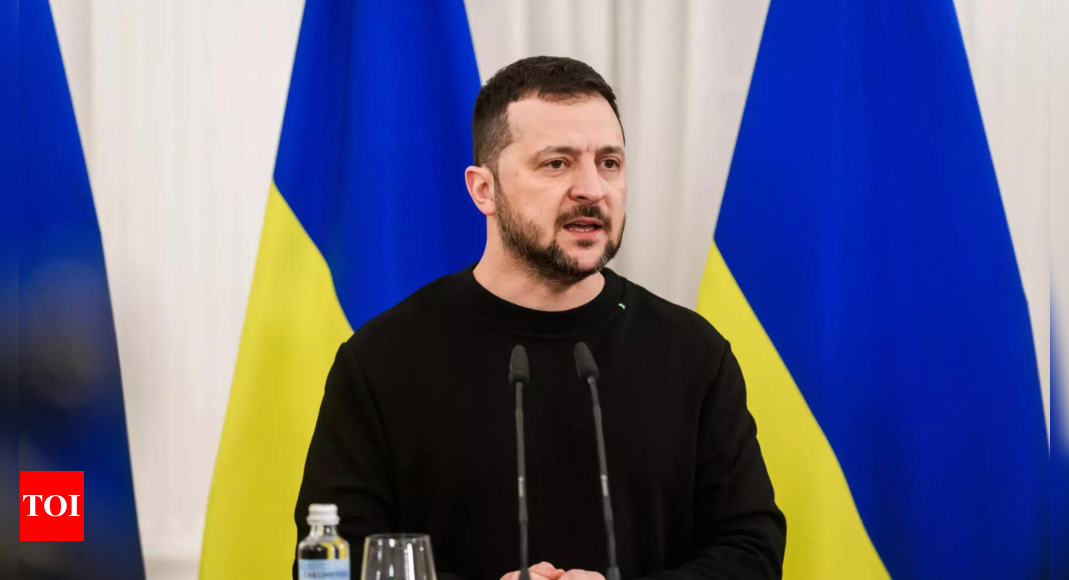
Ukrainian President Volodymyr Zelenskyy dismissed, Lt General Mykola Oleshchuk, the commander of country’s air force, four days after an F-16 warplane provided by western allies crashed during a Russian bombardment, killing the pilot.
The firing took place as a dispute emerged involving a Ukrainian lawmaker’s claims about the incident. The United States experts are aiding in the investigation of the crash, which marked the first reported loss of an F-16 in Ukraine.
The dismissal order for Lt General Mykola Oleshchuk was published on the presidential website.
Zelenskyy immediately addressed the country, stressing the need to protect personnel and strengthen the army at the command level. Shortly after, Lt General Anatolii Kryvonozhko was appointed as the acting air force commander by the Ukrainian army’s general staff.
“We need to protect people. Protect personnel. Take care of all our soldiers,” said Zelenskyy in his address following the publication of the order.
The dismissal coincided with intense criticism directed at a deputy head of the Ukrainian parliament’s defense committee, lawmaker Mariana Bezuhla, who claimed the F-16 was downed by a patriot air-defense system during its operation.
Bezuhla’s claim, based on unnamed sources, demanded accountability for what she described as an error.
In response, Oleshchuk accused Bezuhla of defaming the air force and discrediting US arms manufacturers. He expressed his hopes that she would face legal consequences for her claims.
“The truth will win,” Bezuhla posted on X shortly after the dismissal order was made public.
Oleshchuk did not deny the possibility that the F-16 was hit by a Patriot missile. The air force confirmed that US experts have joined the Ukrainian investigation into the crash.
While internal disputes unfolded, a Russian attack using powerful plane-launched glide bombs struck the northeastern city of Kharkiv, resulting in six fatalities, including a 14-year-old girl on a playground, and 47 injuries.
Regional governor Oleh Syniehubov reported that the bombs hit five locations across the city, which previously had a population of 1.4 million people. One of the bombs blasted a 12-story apartment block, trapping at least one person on an upper floor and raising fears of a structural collapse as emergency crews searched for survivors.
In retaliation, Ukrainian rockets struck the Russian city of Belgorod and its surroundings late on Friday, killing five and injuring 37, according to Belgorod regional governor Vyacheslav Gladkov. The region, which borders northern Ukraine, experiences frequent drone and artillery attacks.
Zelenskyy cited the Kharkiv strikes as further evidence in urging Western partners to lift restrictions on what the Ukrainian military can target with donated weapons.
The Kharkiv strike “wouldn’t have happened if our defense forces had the capability to destroy Russian military aviation at its bases. We need strong decisions from our partners to stop this terror,” Zelenskyy said.
F-16 warplanes, which Ukraine began receiving from European countries at the end of the previous month, are among the weapons that could be used to target Russian bases behind front lines. However, analysing the crash is ongoing, as announced by Oleshchuk on Telegram prior to his dismissal.
“We must carefully understand what happened, what the circumstances are, and whose responsibility it is,” Oleshchuk wrote shortly before his dismissal.
The crash represented the first reported loss of an F-16 in Ukraine’s conflict, where at least six such jets are now believed to have been delivered. Military experts have voiced that the introduction of F-16s might not be a game-changer in the war against Russia, given Moscow’s substantial air force and sophisticated air-defense systems.
However, Ukrainian officials valued the addition of the supersonic jets, which are equipped with modern weapons, as an opportunity to challenge Russia’s air superiority.
On the battlefield, Russian forces continue their gradual advance into eastern Ukraine, while Ukrainian troops are holding positions in the Kursk border region of western Russia following a recent incursion.
The Institute for the Study of War, a Washington-based think tank, predicted losses of Western-provided military equipment for Ukraine during combat but emphasised the major impact of any F-16 losses on Ukraine’s air defense capabilities.
In further developments, European Union defense ministers agreed to enhance their training program for Ukrainian troops. The target was raised to 75,000 with an additional 15,000 recruits expected by the year’s end, confirmed EU foreign policy chief Josep Borrell.
The announcement was made after a ministers’ meeting in Brussels.
“Today the ministers agreed to raising the target to 75,000, adding 15,000 more by the end of the year,” Borrell told reporters post-meeting.
“The training has to be shortened and adapted to the Ukrainian training needs,” Borrell added. He noted that the EU would establish a small “coordination and liaison cell” in Kyiv to enhance the effectiveness of the training program.
To date, 60,000 troops have completed the bloc’s training scheme, which is conducted outside Ukraine.
The firing took place as a dispute emerged involving a Ukrainian lawmaker’s claims about the incident. The United States experts are aiding in the investigation of the crash, which marked the first reported loss of an F-16 in Ukraine.
The dismissal order for Lt General Mykola Oleshchuk was published on the presidential website.
Zelenskyy immediately addressed the country, stressing the need to protect personnel and strengthen the army at the command level. Shortly after, Lt General Anatolii Kryvonozhko was appointed as the acting air force commander by the Ukrainian army’s general staff.
“We need to protect people. Protect personnel. Take care of all our soldiers,” said Zelenskyy in his address following the publication of the order.
The dismissal coincided with intense criticism directed at a deputy head of the Ukrainian parliament’s defense committee, lawmaker Mariana Bezuhla, who claimed the F-16 was downed by a patriot air-defense system during its operation.
Bezuhla’s claim, based on unnamed sources, demanded accountability for what she described as an error.
In response, Oleshchuk accused Bezuhla of defaming the air force and discrediting US arms manufacturers. He expressed his hopes that she would face legal consequences for her claims.
“The truth will win,” Bezuhla posted on X shortly after the dismissal order was made public.
Oleshchuk did not deny the possibility that the F-16 was hit by a Patriot missile. The air force confirmed that US experts have joined the Ukrainian investigation into the crash.
While internal disputes unfolded, a Russian attack using powerful plane-launched glide bombs struck the northeastern city of Kharkiv, resulting in six fatalities, including a 14-year-old girl on a playground, and 47 injuries.
Regional governor Oleh Syniehubov reported that the bombs hit five locations across the city, which previously had a population of 1.4 million people. One of the bombs blasted a 12-story apartment block, trapping at least one person on an upper floor and raising fears of a structural collapse as emergency crews searched for survivors.
In retaliation, Ukrainian rockets struck the Russian city of Belgorod and its surroundings late on Friday, killing five and injuring 37, according to Belgorod regional governor Vyacheslav Gladkov. The region, which borders northern Ukraine, experiences frequent drone and artillery attacks.
Zelenskyy cited the Kharkiv strikes as further evidence in urging Western partners to lift restrictions on what the Ukrainian military can target with donated weapons.
The Kharkiv strike “wouldn’t have happened if our defense forces had the capability to destroy Russian military aviation at its bases. We need strong decisions from our partners to stop this terror,” Zelenskyy said.
F-16 warplanes, which Ukraine began receiving from European countries at the end of the previous month, are among the weapons that could be used to target Russian bases behind front lines. However, analysing the crash is ongoing, as announced by Oleshchuk on Telegram prior to his dismissal.
“We must carefully understand what happened, what the circumstances are, and whose responsibility it is,” Oleshchuk wrote shortly before his dismissal.
The crash represented the first reported loss of an F-16 in Ukraine’s conflict, where at least six such jets are now believed to have been delivered. Military experts have voiced that the introduction of F-16s might not be a game-changer in the war against Russia, given Moscow’s substantial air force and sophisticated air-defense systems.
However, Ukrainian officials valued the addition of the supersonic jets, which are equipped with modern weapons, as an opportunity to challenge Russia’s air superiority.
On the battlefield, Russian forces continue their gradual advance into eastern Ukraine, while Ukrainian troops are holding positions in the Kursk border region of western Russia following a recent incursion.
The Institute for the Study of War, a Washington-based think tank, predicted losses of Western-provided military equipment for Ukraine during combat but emphasised the major impact of any F-16 losses on Ukraine’s air defense capabilities.
In further developments, European Union defense ministers agreed to enhance their training program for Ukrainian troops. The target was raised to 75,000 with an additional 15,000 recruits expected by the year’s end, confirmed EU foreign policy chief Josep Borrell.
The announcement was made after a ministers’ meeting in Brussels.
“Today the ministers agreed to raising the target to 75,000, adding 15,000 more by the end of the year,” Borrell told reporters post-meeting.
“The training has to be shortened and adapted to the Ukrainian training needs,” Borrell added. He noted that the EU would establish a small “coordination and liaison cell” in Kyiv to enhance the effectiveness of the training program.
To date, 60,000 troops have completed the bloc’s training scheme, which is conducted outside Ukraine.









